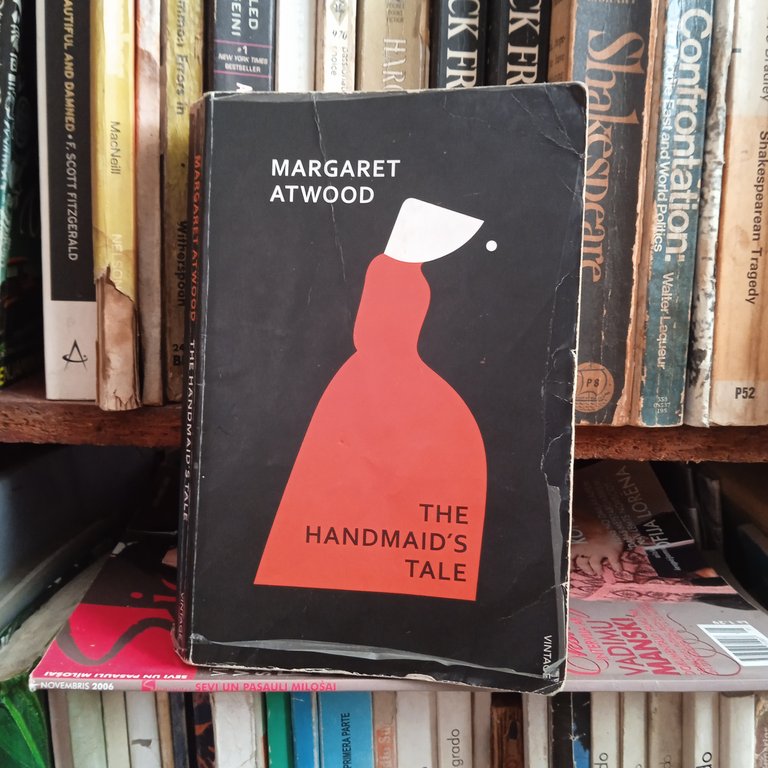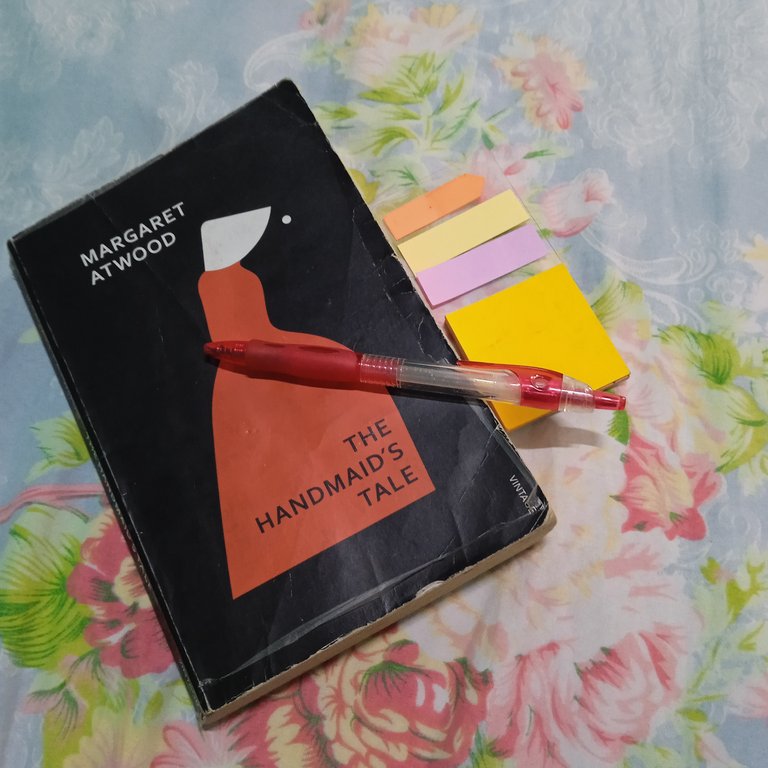
It has been a long time since I was able to finish reading a novel, because it is difficult for me to keep up with such long readings. However, after a few months of starting reading, I was able to finish The Handmaid's Tale, a book by the writer Margaret Atwood, and I want to share my point of view.
Hacía muchísimo tiempo que no era capaz de terminar de leerme una novela, dado a que se me dificulta seguirle el paso a lecturas tan largas. Sin embargo, tras unos meses de haber iniciado la lectura, pude terminar The Handmaid's Tale, libro de la escritora Margaret Atwood, y quiero compartirles mi punto de vista.

The book begins with a sentence of enormous force. "We slept in what had once been the gymnasium." With these words, endless possibilities hit us in the face. Who are you referring to when you say we ? If the place was once a gym, what is it now? Why are they sleeping there?
El libro comienza con una frase de fuerza descomunal. "Dormimos en lo que una vez había sido el gimnasio". Con estas palabras nos golpean en la cara un sinfín de posibilidades. ¿A quiénes se refiere cuando dice nosotros ? ¿Si el lugar alguna vez fue un gimnasio, qué es ahora? ¿Por qué duermen ahí?

The descriptions that follow are full of a confusing nostalgia, and then we are introduced to "the Aunts", the guards and "the Angels"; also in the last sentence we see the names of several women, giving us to understand that there is some kind of system that watches over them. And at this point Atwood already has us hooked, because we all want to know what's going on.
Las descripciones que le siguen están plagadas de una nostalgia confusa, y luego se nos presentan a "las Tías", los guardias y "los Ángeles"; también en la última oración vemos los nombres de varias mujeres, dándonos a entender que hay alguna clase de sistema que las vigila. Y en este punto ya Atwood nos tiene enganchados, porque todos queremos saber qué está pasando.
From the second chapter we know that our narrator is a woman who has been assigned to a house as a maid. Little by little we are getting to know the hierarchies in this society, although in any case nothing is completely clear to us. In fact that is a feature that makes this book so attractive: our maid should wear a red dress and a veil as a uniform and the reader as he reads, it looks like he is wearing the veil too. You cannot see two steps beyond what is happening in the present of the story, because when you think that the action is going to continue in order to unravel the mysteries of the system, the maid begins to have flashbacks, to long for life as it was before, to miss the freedom that she did not know she had.
A partir del segundo capítulo conocemos que nuestra narradora es una mujer que ha sido asignada en una vivienda como criada. Poco a poco vamos conociendo las jerarquías en esta sociedad, aunque de todas maneras nada nos queda totalmente claro. De hecho esa es una característica que hace este libro tan atractivo: nuestra criada debe usar un vestido rojo y un velo como uniforme y el lector a medida que lee, parece que está usando el velo también. No puedes ver dos pasos más allá de lo que está sucediendo en el presente de la historia, porque cuando crees que la acción va a continuar para poder desentrañar los misterios del sistema, la criada comienza a tener flashbacks, a añorar la vida como era antes, a extrañar la libertad que no sabía que tenía.

In a very subtle way we are going through several chapters with deep reflections about loneliness, desire, self-love and the value of life itself. In the midst of this philosophical and sentimental state, small gears are moving in the present of the story that are completely changing the reality of the narrator. And then, suddenly, the true function of maids in this world is revealed to us (which at least to me, it left me in shock).
De una manera muy sutil vamos atravesando diversos capítulos con hondas reflexiones acerca de la soledad, el deseo, el amor propio y el valor de la vida misma. En medio de este estado filosófico y sentimental, en el presente de la historia se van moviendo pequeños engranajes que van cambiando por completo la realidad de la narradora. Y luego, de repente, se nos revela la verdadera función de las criadas en este mundo (cosa que al menos a mí me dejó en shock).
But this is not enough. From this moment on, the maid focuses more on herself and her egoisms, taking advantage of the fact that (by breaking the rules) she has access to new abilities, so to speak. It's exciting to see how he risks so much to be able to have a little satisfaction, at least. In the end, this costs her to be expelled from the house, but we do not know the certainty of the end that awaits her.
Pero esto no es suficiente. A partir de este momento la criada se centra más en sí misma y en sus egoísmos, aprovechando que (al romper las reglas) tiene acceso a nuevas capacidades, por así decirlo. Es emocionante ver cómo se arriesga tanto para poder tener un poco, por lo menos, de satisfacción. Al final, esto le cuesta que la expulsen de la casa, pero desconocemos la certeza del final que le depara.
In a kind of epilogue we know that the whole story has been told on cassettes, which justifies in many cases the constant rambling of the narrator. These cassettes are also a historical test to study the beginnings of the "Gilead Republic", of which it is obvious why most of the records were deleted.
En una suerte de epílogo conocemos que toda la historia ha sido contada en casetes, lo que justifica en muchos casos el constante divagar de la narradora. Dichos casetes resultan además una prueba histórica para estudiar los inicios de la "República de Gilead", de la cual es obvio por qué quedaron borrados la mayoría de los registros.

This is definitely a masterpiece. Margaret Atwood knows how to pull the strings to make us feel powerless, to put ourselves in the shoes of the characters and feel the weight of their decisions on ourselves. A wonderful exercise in fiction and morality. This book deserves a 10/10.
Definitivamente esta es una obra maestra. Margaret Atwood sabe cómo mover los hilos para hacernos sentir impotentes, para ponernos en la piel de los personajes y sentir el peso de sus decisiones sobre nosotros mismos. Un ejercicio de ficción y moralidad maravilloso. Este libro merece un 10/10.

I hope that after this comment more people will be encouraged to read it. Also, there is an adaptation in the form of a series on Netflix that is very similar in level to the book and that, of course, is also recommended.
Espero que luego de este comentario más personas se animen a leerlo. También, en Netflix existe una adaptación en forma de serie que está muy igualada en nivel al del libro y que, por supuesto, también queda recomendada.
That's all for today's post. The photos used are my property.
Until next time!
Esto es todo por el post de hoy. Las fotos utilizadas son de mi propiedad.
¡Hasta la próxima!
